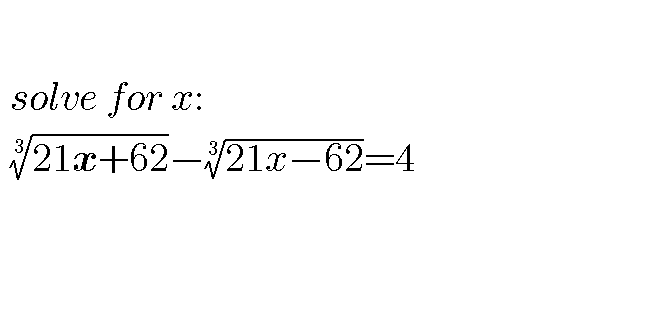
AlgebraQuestion and Answers: Page 327
Question Number 48795 Answers: 1 Comments: 1
Question Number 48687 Answers: 0 Comments: 0
Question Number 48705 Answers: 3 Comments: 2
Question Number 48678 Answers: 0 Comments: 0

Question Number 48675 Answers: 2 Comments: 0
Question Number 48559 Answers: 3 Comments: 0

Question Number 48553 Answers: 1 Comments: 2
Question Number 48509 Answers: 0 Comments: 0
Question Number 48482 Answers: 0 Comments: 0
Question Number 48447 Answers: 0 Comments: 4
Question Number 48443 Answers: 1 Comments: 3
Question Number 48368 Answers: 1 Comments: 0

Question Number 48367 Answers: 2 Comments: 0

Question Number 48306 Answers: 1 Comments: 0
$$\mathrm{x}^{\mathrm{2}} +\mathrm{4x}+\mathrm{1}=\mathrm{9} \\ $$
Question Number 48295 Answers: 1 Comments: 0

Question Number 48294 Answers: 2 Comments: 3

Question Number 48272 Answers: 0 Comments: 1
$$\mathrm{z}^{\mathrm{5}} =\mathrm{32} \\ $$$$\mathrm{find}\:\mathrm{all}\:{root}\:{z} \\ $$
Question Number 48225 Answers: 1 Comments: 0
Question Number 48224 Answers: 1 Comments: 0
$${e}^{{z}} =\mathrm{1}−\sqrt{\mathrm{3}}{i} \\ $$$${z}=.. \\ $$
Question Number 48222 Answers: 0 Comments: 0
Question Number 48204 Answers: 1 Comments: 0
Question Number 48161 Answers: 1 Comments: 1
Question Number 48075 Answers: 1 Comments: 1
Question Number 48055 Answers: 2 Comments: 6
Question Number 47993 Answers: 0 Comments: 5
Question Number 47986 Answers: 3 Comments: 1

Pg 322 Pg 323 Pg 324 Pg 325 Pg 326 Pg 327 Pg 328 Pg 329 Pg 330 Pg 331
